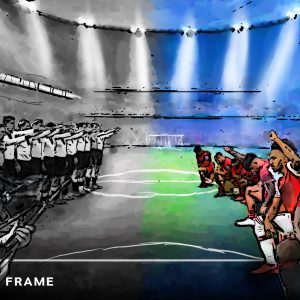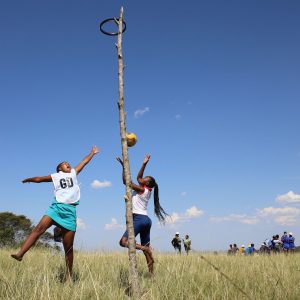What does the future hold for the Lions Tour?
SA Rugby had no choice but to go ahead with the tour following the financial devastation that Covid-19 inflicted on the local game. This state of affairs could be an ominous sign of things to come.
Author:
17 July 2021

Could a real British and Irish Lions tour be a thing of the past? We’re already watching a very different rugby tour unfold amid the threat of Covid-19 in South Africa. Somewhere in the future there will be another one, but chances are, it just won’t be the same.
The British and Irish Lions tours have traditionally been about getting out into the rural areas, facing opponents that normally wouldn’t come within touching distance of a touring Test rugby team and bringing a horde of fans who inject both cash into the local economies and life into rugby in the provinces. This tour won’t do that.
A year without Test rugby – in all its forms – and without crowds has left a massive hole in the revenue of SA Rugby and its provinces. For that reason alone, this tour had to go ahead despite the misgivings and the raging third wave of infections. Left with a choice between survival and the collapse of the game, the decision was easy.
Related article:
A Lions tour is possibly the only real tour left over from the amateur era. And each one is special. Up to 20 000 fans from Britain and Ireland travelled to see the second Test in Wellington in New Zealand in 2017. These tourists didn’t just inject money into the local economy and drive up beer sales, but they also reminded us that camaraderie and fellowship are what the game is about.
The Lions tours are supposed to be the fabric of generational rugby joy, where legends are made and tries still celebrated decades later. But the threat of losing their soul has been there for a number of tours now, and every four years the question comes up whether it is more of a marketing exercise than a genuine sporting experience?
The number of games the Lions played on a tour was slashed even before Covid-19 hit, cutting out teams in rural areas. The idea behind these cuts was to maximise revenues. And now that the decision has been taken to push ahead with the tour, no matter what the cost, there are those who are asking whether the “money-making exercise” is being laid bare – especially as it’s being done without its heartbeat: the supporters.
Damaging the brand
“The reality is that it has turned into a money-making machine, but that is usually wrapped in the supporter base, the sea of red, the community experiences and the players having a great time and playing and training with people they have huge respect for,” legendary Irish player Brian O’Driscoll pointed out in a recent podcast of The Good, The Bad and The Rugby.
“The money-making component gets lost in that and makes it more palatable, whereas it is less palatable at the moment because the Lions, more than any other team in rugby, is dependent on the crowds. It is dependent on the supporter base and those four countries coming together.
“They are having none of that. They are not able to feed on any energy coming from the crowd whatsoever. You are getting a completely diluted sense of what it is to be a Lion. All of these factors coming together are coming together to cause, in my opinion, damage to the overall brand.

“That said, I understand the need for them to go and see out the rest of this tour, because it’s potentially financial ruin and bankruptcy if they don’t manage to get through this Test series. It has got to be taken as a possible viable option on the basis that if the Test series isn’t finished, it could bankrupt the Lions or the Springboks. When you are looking at the severity of those outcomes, you have to take on every option available.”
In SA’s Rugby’s latest annual report released in May, governing body president Mark Alexander underlined what it meant if the tour didn’t go ahead. “Last year, the rugby industry had to join hands to navigate the crises and the CEO and his team did a fantastic job securing some of the funding from the sponsors and broadcasters, considering the non-delivery of the rights sold,” Alexander said.
“Unfortunately, this year our rights partners are not as generous and sympathetic as last year, and funds for the rights will be directly linked to rights delivery. If there is no play, there is no payment.
“If we did not play rugby this year, we would have closed our doors. South African rugby depends on generating money, of which 99.9% comes from playing.”
Limited options
The decision to play the tour in South Africa has by no means been a popular one. Australia’s offer to host it was rejected as being unfeasible. Plan B was to play the tour in the United Kingdom, but Prime Minister Boris Johnson’s government could not meet the deadline to allow fans into the stadiums by the date agreed by all parties. So that fell through. This meant that by March there was only one option: play it in South Africa and pray that the Covid-19 spikes would be over.
What has happened since then has hardly been the tour organisers’ fault, but it has brought a stark reminder of how a decision can go wrong without any party being at fault. The organisers genuinely believed they could get fans into stadiums by the time the tour started. But then the dreaded Delta variant of the Covid-19 virus hit South Africa, and the third wave has been even more devastating than the previous two.
Whereas the UK has vaccinated the majority of its population, South Africa’s vaccine programme has offered no such relief. As a result, massive crowds flooded to the Uefa European Football Championship and the Wimbledon tennis tournament, while the soulless, empty stadiums in South Africa and news of Covid-19 outbreaks in the Springbok, Georgian and Lions squads made the situation even more depressing.
Related article:
Former Lion Ben Kay made it plain when he said there was no option but to proceed with the tour. “When they were looking at options, the South African Rugby Union clearly said, ‘we’ve got a contract in place, we can make it happen,’ and with the move to Cape Town, I think everyone associated with the tour will try and get the tour over the line,” he wrote on the website RugbyPass.
“I’ve seen some fans saying, what about the UK, which had 60 000 for the Euros at Wembley? But it’s not as straightforward as that. Our government has to give the green light, then you have to think about getting the logistics of getting people to Twickenham, traffic management, speaking to the local councils for permission, and this in a matter of days. The choice is simple, do it this year or wait until 2025 in Australia.
“Finally, a lot of people are suggesting the Tour should have been cancelled a long time ago. That would have meant that the Lions wouldn’t have had a series against the Springboks for 24 years. Players of British & Irish Lions quality would have missed out on the ultimate honour. I don’t see how we are better off with the tour not happening at all, rather than giving it a go and at least trying to complete it. We know the traditional Lions ethos is built on amateur values but we need to be honest and accept the Lions, like any other sporting brand, is a business.
Related article:
“Lots of traditionalists say, ‘oh, it’s all about the money’, but it’s not greed, no one is making a profit. As a game, we’re losing money hand over fist; it’s about trying to survive. Those people who are saying, ‘bin it off, move it to next year’, are the same people who are saying how badly the unions are treating player welfare but you can’t go from a Lions tour into a World Cup the next summer.
“Trust me, as someone who has been through a pre-World Cup training camp, there is no way you can go from an eight-week Lions tour, into an attritional domestic season and then straight into a pre-World Cup block. It would be ridiculous.”
And therein lies the rub. When the tour could have been postponed for a year, England and Ireland didn’t want to because it would interfere with their 2023 World Cup preparations. Australia and New Zealand refused because Ireland and England were due to tour and they saw it as a money-spinning exercise post-Covid-19.
Hard-hitting truths
For South Africans, another big concern has been the lack of opposition for the British and Irish Lions teams. They beat the Sharks and the Johannesburg-based Lions without raising a sweat before they were beaten by a South Africa A side filled with World Cup winners. With the Springboks pulled out to be in the Bok camp and teams hollowed out by international defections – more than 400 professional rugby players are playing abroad – South Africa’s depth is no longer what it should be.
What is left after you take the Boks out is a mixture of raw, young talent. South Africa still produces an amazing amount of talent on its conveyor belt, but this is increasingly not supplemented by experience, as European sides are able to do. The resources are spread too thin, and it is too easy for a player to snap up a contract in Europe or Japan when the going gets tough. A weak currency makes it more understandable that the majority of talent chooses professional rugby abroad.
The one side who could have tested the Lions, the Bulls, had their game called off because of a Covid-19 outbreak, robbing the tourists of a decent outing.
Related article:
When the pandemic subsides and this tour is over, inevitably there will be a hunger for the tour to Australia in 2025. But even while the fans will be champing at the bit to grab a flight down under, the entire Lions model will need a rethink.
If we think South African franchises have been hollowed out, Australia is in a worse position. Rugby Australia only staved off bankruptcy by taking a massive loan from World Rugby, and it needs to be repaid. Top Australian sides have been on the losing side in Trans-Tasman clashes and there is a genuine concern that without the Super Rugby tournament, their rugby will suffer even more. Not even the most optimistic Australian rugby fan will be thinking they will be stronger when the Lions arrive. For now, it is also about surviving.
And it is a real possibility that the Lions will find themselves in a similar position in terms of the lack of opposition in the lead-up to the Tests. Australia – while not having the playing depth of the Springboks – has a fair amount of top talent in Europe as well, which has not helped its local game.
At the moment it is difficult to argue that only New Zealand will constitute a proper Lions tour as we know it, especially given the strength of the provincial opposition in the country. And this leaves the Lions with a quandary: the fans will love the victories, but any team wants to be tested on a tour.
Related article:
It wouldn’t be surprising to see composite sides replace provincial ones in the future, as the strength of the opposition becomes more of a talking point. But more than that, there is a real concern that World Rugby will need to intervene to protect Lions tours and not just leave them up to circumstance.
The current tour is showing that intervention from the top could have made it a better experience for all and helped navigate the realities of a pandemic. But World Rugby stuck its head in the sand and did nothing.
So now we’re left with what we have – a tour in a form that nobody enjoys because it simply had to take place. This tour will finish unless the pandemic stops it. But afterwards, a long and hard reassessment needs to happen, or the Lions tour as a special part of rugby will disappear altogether.





